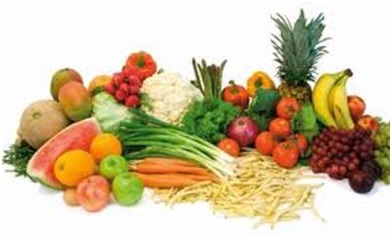Foods I say is medicine to the body, it is evident that low or lack of intake of some food nutrients result in deficiency diseases e.g. Low intake of vitamin C rich foods like orange leads to poor resistance to infections.
Vitamins and minerals are foods that protect the body from infections and strengthen the immune system.
Vitamins and minerals are referred to as micronutrients. This is because they are needed in smaller quantities compared to nutrients like carbohydrates, proteins, fats and oils which we have looked at in previous editions. Vitamins and minerals are nutrients with health benefits to the body. Our bodies undergo several processes to keep it healthy. Vitamins and minerals are used for all these processes. Without them the body struggles to fight of diseases and recover from injuries.
Vitamins and minerals are mostly found in fruits and vegetables. Fruits and vegetables consumption is however very low in Ghana.This is the main reason for micronutrient deficiencies in the country. If I may ask, have you taken a fruit or vegetable today? Let us take a look atvitamins and minerals to give you an idea of which foods contain which type of vitamin or mineral to help you consume them regularly. In this edition we will go consider vitamins.
Vitamins
There are 13 essential vitamins the body needs to function. They are vitamins A, C, D, E, K and B vitamins: B1(thiamine) B2 (riboflavin), Niacin, Folate (Folic acid), B6 (pyridoxine), B12(Cobalamin), Pantothenic acid and Biotin. These are categorized into water-soluble vitamins and fat-soluble vitamins.
Water soluble vitamins dissolve in water and can easily mix with your blood for absorption. It is also easily eliminated from the body through urine. This means that a small amount is stored in the body at a time. Water soluble vitamins are Vitamins C and the B Vitamins (riboflavin, niacin, thiamine, folate, B12, B6, pantothenic acid and biotin).
Fat-soluble vitamins are stored in fat and oil for transport around the body. It is not easily eliminated from the body because it is found in fat/oil. It tends to stay longer in the body. Taking too much fat soluble vitamins can be toxic to the body. This is because it is not quickly eliminated from the body and gets accumulated with time above the level the body needs. Fat-soluble vitamins are; Vitamins A, D, E, and K.
The table below provides the functions and sources of the essential vitamins;
| Vitamin | Functions | Sources | |
| Fat-Soluble Vitamins | |||
| Vitamin A | Promotes normal growth of bones,
growth and repair of body tissues; bone and tooth formation; vision; antioxidant in the form of beta-carotene |
1. Dark green vegetables
eg. Kontomire ademeh, ayoyo, bokoboko, Nunu, Boma 2. Yellow-orange fruits and vegetables eg. Mango,carrot and Pawpaw, 3. Milk, butter, dairy |
|
| Vitamin D | Regulates absorption and use of calcium and phosphorus; aids in building and maintaining bones and teeth | Direct exposure of the skin to sunlight, fortified milk, margarine, eggs, liver, fish | |
| Vitamin E | Protects red blood cells; antioxidant (protects fat-soluble vitamins); stabilizes cell membranes | 1. Vegetable oils eg. Olive oil,
4. 2. Dark green leafy vegetables eg. Kontomire, ademeh, ayoyo, bokoboko, Nunu, Boma, Spinach, Broccoli, Collards, Kale 3. Nuts eg. Almonds 4. Legumeseg. Groundnut 5. Egg yolks, 6.salad dressings, 7. Mayonnaise, 8. wheat germ, 9. whole grains |
|
| Vitamin K | Required for synthesis of blood-clotting proteins | 5. 1. Bacterial synthesis in digestive tract
6. 2.Dark green leafy vegetableseg.Kontomire, ademeh, ayoyo, bokoboko, Nunu, Boma 7. 3. Animal product; liver, milk, egg yolk 8. 4. Grain products, |
|
| Water-Soluble Vitamins | |||
| Vitamin C | helps wounds to heal, maintains bones and teeth, strengthens blood vessels, it serves as an antioxidant, strengthens resistance to infection and helps body absorb iron | Citrus fruits eg. Oranges, tangerine. Pineapple. tomatoes, potatoes, dark green vegetables, peppers, lettuce, strawberries, mangoes, papayas, cauliflower | |
| Vitamin B1 (thiamin) | Helps enzymes release energy from carbohydrates | Meat, pork, liver, fish, poultry, whole-grain, cereals, legumes, nuts, green leafy vegetable | |
| Vitamin B2(riboflavin) | Helps enzymes release energy from carbohydrates, protein and fat; promotes healthy skin and good vision | Milk, cheese, yogurt, cereals, green leafy vegetables, fish, liver, lean meats, yeast | |
| Niacin | Helps enzymes release energy from carbohydrates, protein, and fat; promotes healthy skin, nerves, and digestive system | Yeast, whole grains and enriched breads and cereals, milk, meats, nuts, legumes, peanuts | |
| Folate (folic acid) | Required for red blood cell formation, new cell division, protein metabolism | Dark green leafy vegetables, citrus fruits, enriched grains and cereals, legumes, seeds, melons, yeast, orange juice, asparagus | |
| Vitamin B6 (pyridoxine) | Required for amino acid metabolism; used in protein and fat metabolism; aids in forming red blood cells and antibodies | Dark green leafy vegetables, whole-grain products, meats, liver, poultry, fish, shellfish, soybeans, wheat germ, fruits | |
| Vitamin B12 (cobalamin) | Necessary for normal growth; helps maintain nerve cells and red blood cells; aids in synthesis of genetic materials | Primarily in animal products meat, fish, poultry, liver, eggs, milk and milk products. | |
| Biotin | Coenzyme in energy metabolism; glycogen formation; fat synthesis | Legumes, egg yolks, chocolate, cauliflower, yeast, liver, nuts, milk | |
| Pantothenic acid | Component of coenzyme for energy metabolism | Legumes, whole grains, lean beef, milk, potatoes, yeast, egg yolks, liver, groundnuts, tomatoes, broccoli, fish, poultry; small amounts in fruits and vegetables | |
–
By: Frema Addy Research
Assistant at the University of Ghana, Legon
email: [email protected]


